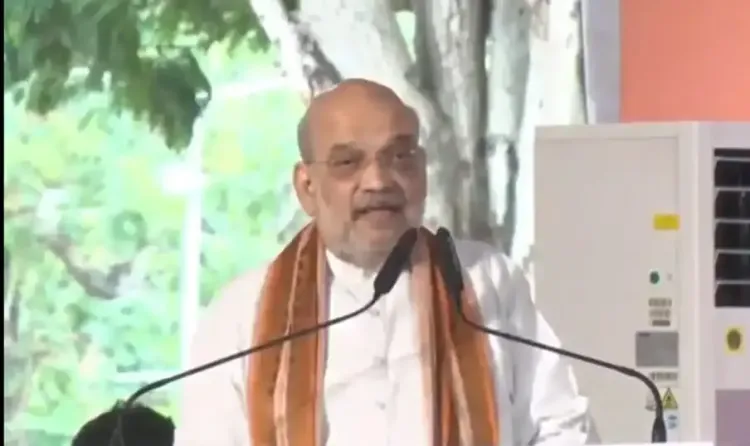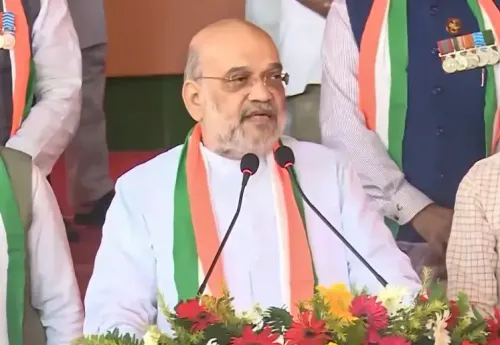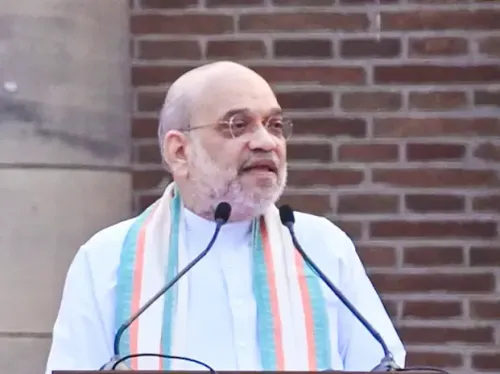Is Operation Sindoor a Necessary Fight for Swaraj?

Synopsis
Key Takeaways
- Responsibility for India's future lies with all citizens.
- Operation Sindoor exemplifies the fight for Swaraj.
- Shrimant Bajirao Peshwa's legacy is vital for national pride.
- Pune is the historical birthplace of Swaraj values.
- Patriotism and dedication are essential for national security.
Pune, July 4 (NationPress) Union Home Minister Amit Shah emphasized that the duty of shaping the India envisioned by Shivaji Maharaj lies with 140 crore Indians, highlighting that at times, it is essential to fight for our Swaraj. He referenced Operation Sindoor as a pertinent example.
“When the struggle for Swaraj was necessary, we engaged. If defending Swaraj calls for action, we shall respond. Operation Sindoor serves as a testament to this. However, alongside Swaraj, the aspiration for a resplendent India is intertwined with the legacy of Shivaji Maharaj,” he remarked during his address following the unveiling of the statue of the revered patriot and emblem of Maratha valor, Shriman Bajirao Peshwa, at the National Defence Academy.
Among the attendees were Chief Minister Devendra Fadnavis, Deputy CMs Eknath Shinde and Ajit Pawar, Higher and Technical Education Minister Chandrakant Patil, and Union Minister of State for Civil Aviation Murlidhar Mohol.
“Our vision must be to establish an India that ranks as the best globally. The figure who embodies the spirit of effort, dedication, and sacrifice for this is Shrimant Bajirao Peshwa,” he stated.
“Prime Minister Modi has presented a framework for development and heritage. Numerous figures from our millennia-old culture continue to inspire us. Their histories should be shared with today's youth. Bajirao fought not for personal glory but for the nation and Swarajya. The British altered historical narratives. Despite his immense strength and influence, Bajirao remained a lifelong Peshwa. He championed Swarajya. Throughout his 40 years, he inscribed an eternal history that remains unmatched for centuries,” the Home Minister noted.
“The motivation from placing the statue of Shrimant Bajirao at the National Defence Academy, where leaders of all three armed forces are trained, will ensure the security of India's borders,” he asserted.
“Certain principles of warfare never become obsolete. The significance of strategy, the urgency of action, the essence of dedication, the spirit of patriotism, and the ethos of sacrifice are crucial. These elements lead armies to victory; only the weapons evolve. Shrimant Bajirao Peshwa epitomizes these qualities across 500 years of Indian history,” remarked HM Shah.
He continued, “Shrimant Bajirao Peshwa engaged in 41 battles over 20 years without a single defeat, a record unmatched by any other leader. The National Defence Academy is the most appropriate site for the statue of such a courageous warrior, who remained undefeated until his passing.”
He highlighted that Pune is the birthplace of the values of Swaraj, noting that the concept spread throughout the nation from there in the 17th century.
“When the time arose to once again contest for Swaraj against British rule, it was Tilak Maharaj who first roared like a lion: 'Swaraj is my birthright.' The example of what an individual can achieve for their nation during their lifetime was also set by Veer Savarkar from this sacred land of Maharashtra,” he added.
HM Shah also linked Bajirao's legacy to a broader historical narrative, acknowledging the Maratha warrior and the Peshwas for safeguarding India's cultural and structural identity through their resistance to external threats.
He concluded, "Had the fight for Independence, initiated by Shivaji Maharaj and carried forward by the Peshwas over a century, not taken place, India's fundamental structure would have vanished."









